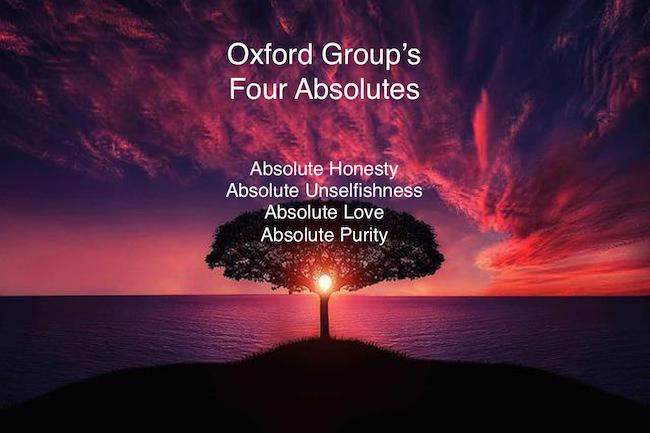Honesty, Purity, Unselfishness, and Love by Dick B via Silkworth.net
What are these “Four Absolutes?”
You have to be around A.A. for quite a while before you hear much about the “Four Absolutes.”
Exceptions to that statement are those who read our Conference Approved history DR. BOB and the Good Oldtimers, or Dr. Bob’s last major speech, or are in the chain of sponsees beginning with Clarence Snyder, or come from the Akron area, or who have dipped their feet into A.A.’s Oxford Group origins, the role of Rev. Sam Shoemaker, and the notes made and shared by Dr. Bob’s wife, Anne Smith.
We’ll provide a brief statement and documentation of the facts about the Absolutes. And these are long overdue because there have been many misunderstandings, misinterpretations, and confusing questions. Just take this example: Even those who ought to have known better sometimes say that the Four Absolutes constitute a distillation by Dr. Robert E. Speer of Jesus’s teachings in the sermon on the mount. But that is not so!
The “Four Absolutes” actually originated in a book by Dr. Robert E. Speer, titled “The Principles of Jesus.” Speer laid down four principles which he believed represented the uncompromising moral principles taught by Jesus. Speer cited verses from the Bible for each proposition. And his four principles were thereafter most commonly called the “Four Standards.”
I’ve heard several early Oxford Group activists use that term. I’ve seen it used often in Anne Smith’s journal. And it pops up in some of the Oxford Group writings I’ve researched. On the other hand, Dr. Bob often said the “standards” were “yardsticks.” But the term “absolutes” really came from Professor Henry B. Wright of Yale who popularized the expression “absolutes.” He cited Speer’s work. He dug up many verses from the Gospels and the Church Epistles that set forth these same principles. And Wright’s immense influence on Dr. Frank Buchman, Founder of the Oxford Group, resulted in the adoption of the phrase “Four Absolutes.” Bill Wilson referred to them by that name and even claimed they were incorporated into his Steps Six and Step Seven.




